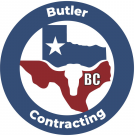One of the frequently asked questions we receive is “should I use nails or screws on my fence?”. Some companies pride themselves in using screws, but here at Butler Contracting, we prefer using a specific type of nail fastener for a number of reasons.
Wood Screws
If you’re using a screw, the primary driving force is from the torque (rotational force) applied to the screw, most likely from a human-operated electric driver. The human hand is not perfect and a screw can be sunk in at different depths and twisted at different torques. Screws are prone to stripping, as well as holding boards more securely in some areas than in others – which creates inconsistency and unevenly applied force. As wood becomes weathered, these inconsistencies begin to show over time as the boards start to come apart and the screws work themselves out.
Ring-Shank Nails
We like to use nails because of their consistency. Our preferred nail is made of galvanized steel and is known as a ring-shank nail that has contoured ribs around the circumference of each nail. Using a nail gun with a properly sourced nail allows for much greater consistency and accuracy because we are able to set the pressure on the air compressor to the same PSI every time. This delivers a consistent nailing pattern and drive and enables us to drive each nail fast, correctly, and reliably every time.
Smooth Shank Nails
Some folks have concerns about nails due to structures built with them not holding up for very long. There are various ways in which nailed structures can come apart, such as deck boards popping up or fence boards coming loose. The likely reason that this happened was because a smooth shank and/or non-galvanized nail was used. Weather conditions can cause boards to swell and shrink with a rise and drop in temperature. This causes the board to move and in that set of circumstances, a smooth shank nail will come loose over time. If a non-galvanized nail is installed, it will rust out with contact with moisture and fail causing the fence pickets to fall off the rail.
Sometimes Screws Are Better
There are, however, certain situations in which screws have an advantage over nails depending on the terrain and weather. We use certain types of structural screws and lag screws for our fences, but we don’t use exterior deck screws to hang Simpson brackets on posts and rails because they’re not quite as strong as a nail.
Nails Are Stronger Than Screws
This might be news to you, but a nail is actually stronger than a screw structurally. If you took a pair of vice grips or pliers and bent a standard three-inch deck screw back and forth, it wouldn’t take long before the screw gave way and snapped. If you took that same style of the nail and bent it back and forth, it’s going to take a lot more force, torque, and bending action before the nail succumbs and breaks. The sheer strength of a nail is much greater than a screw, so if you’re going to use a screw, make sure it’s a properly sourced structural screw that’s rated for its application.
The Butler Contracting Way
Some folks like to use screws, some don’t, but the Butler Contracting way is to put your pickets on with properly sourced galvanized steel ring-shank nails. If we are using a screw, you can trust that it’s going to be a structural screw rated for the application that we’re using it for. Structural fasteners are heat-treated and made from a stronger steel that increases the overall durability of the screw.
If you need a fence repair, replacement, or a new build, give us a call! Use our FREE fence estimating tool and see what style and type of fence you want to build – you can even select the budget that works for you as we also offer financing. When you’re ready to do a project, you can reach us at (844) 628-8537 or visit our website: Butler Contracting.



